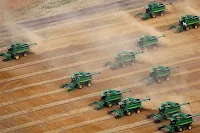Manitoba News Release
............................................................
April 22, 2010
- - -
Over 180 Projects Approved
For 2009-10 and 2010-11

The Manitoba Sustainable Agriculture Practices Program (MSAPP) has completed its first intake of applications for beneficial management practice (BMP) incentive funding for the 2010-11 fiscal year, Agriculture, Food and Rural Initiatives Minister Stan Struthers announced today.
"The MSAPP is a incentive-based program announced by the province in 2008 to encourage producers to adopt and implement BMPs to help reduce greenhouse-gas (GHG) emissions that contribute to climate change," said Struthers "The MSAPP is part of our commitment to reduce greenhouse gas emissions by 2012 to help achieve its climate change objectives and transition to a low-carbon and green economy."
To date, over 180 sustainable agriculture projects have been
approved with Manitoba

producers eligible for payments of over $2 million. Many different projects from every region of the province have been approved including funding for reduced GHG emissions from manure storage, reduced tillage, manure land application, perennial cover for sensitive land, spring fertilizer application, and improved pasture and forage quality.
When complete, it is expected these new projects will provide environmental benefits for both the individual participant and for all Manitobans. The investment in these projects will continue to provide improvements in air, water and soil quality by reducing nutrient and pathogen loss to the environment, preventing soil erosion and improving biodiversity and wildlife habitats, said Struthers.
The total GHG reductions from the actions taken so far by Manitoba producers are estimated at 82,000 tonnes of carbon dioxide, equivalent over the life of the program to approximately 59,000 tonnes in 2009-10 and 23,250 tonnes in 2010-11. GHG emissions from agriculture soils fluctuate from year to year because the types of crops grown affect the amount of fertilizer applied as well as the amount of crop residue returned to the soil after harvest.
For many years, prior to the introduction of the MSAPP, Manitoba producers adopted and implemented BMPs. These included but were not limited to:
- conservation tillage;
- cover crops;
- organic farming;
- effective nutrient management;
- manure management, handling and proper storage; and
- shelterbelts and riparian buffers
The MSAPP has seen an overwhelming response from agricultural producers in Manitoba, said Struthers, adding the program is cost shared with producers and the positive response demonstrates the value Manitoba producers place in making their operations more environmentally sustainable. The MSAPP will run until March 31, 2012.
- 30 -














